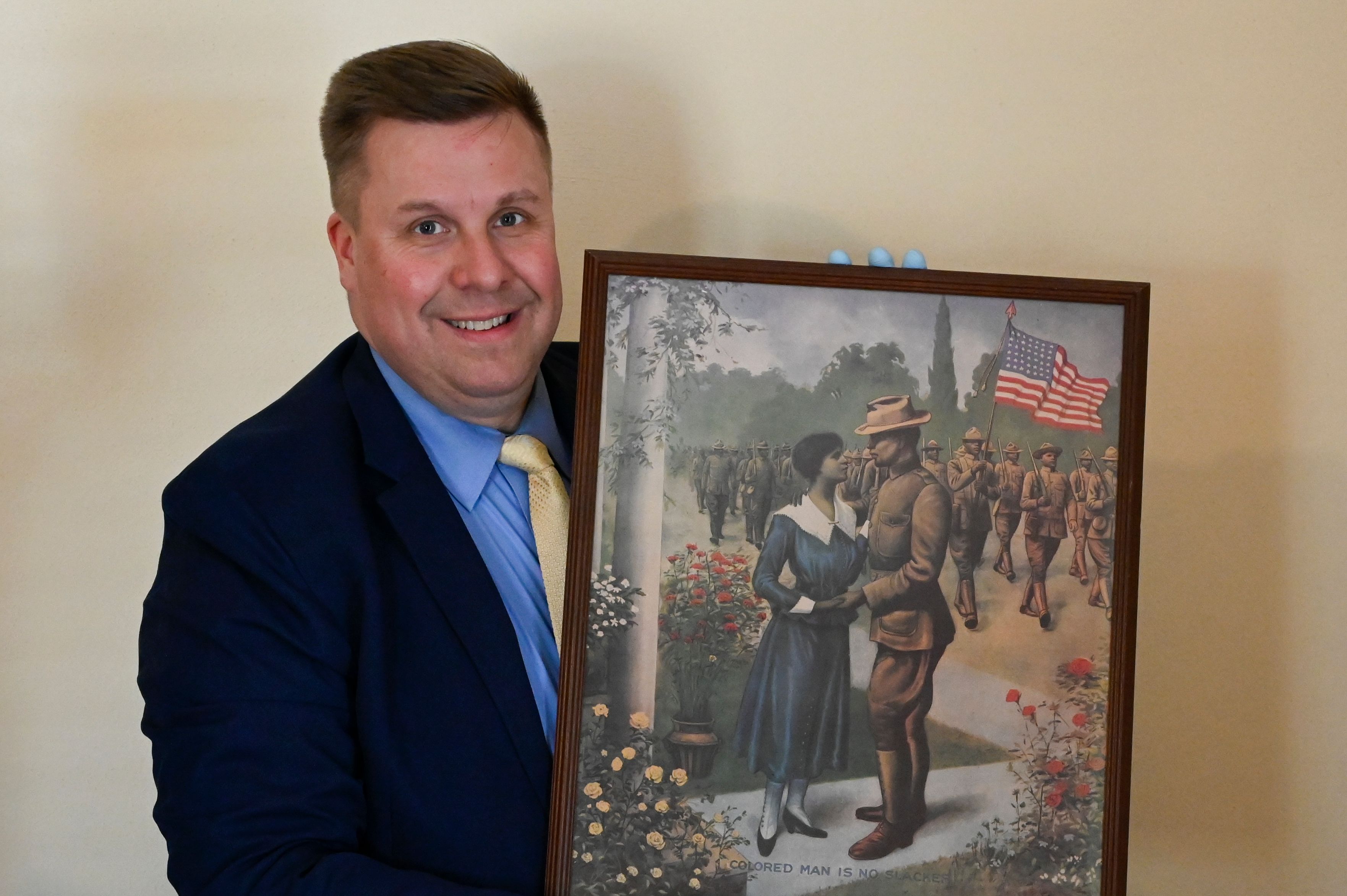WWI propaganda posters at GCSU show efforts to recruit African American soldiers

WWI propaganda posters at GCSU show efforts to recruit African American soldiers
During the remainder of Black History Month, the public is invited to see two authentic propaganda posters at Georgia College & State University that give a glimpse of life during World War I and America’s efforts to recruit African American soldiers.
The posters—called “True Blue” and “Colored man is no slacker”—hang on the wall of a replicated classroom at Georgia College’s Sallie Ellis Davis House. They reveal a time when African American men enlisted, answering the call to defend their country, but were often met with discrimination and put in segregated units.
“They would have been among the first kind of propaganda pieces that targeted the African American community,” said Matt Davis, director of Historic Museums.
“It made sense for them to be hung at a school that had kids who were of age to go into the military,” he said. “Sallie Ellis Davis had students who went to war, but we don’t know if these posters were in her school at the time. They certainly would’ve been around Milledgeville.”
Sallie Ellis Davis was a prominent educator, pillar and inspiration in Baldwin County’s African American community. She earned her Normal School degree in 1899 at Atlanta University, then opened Eddy High School. In 1910, she and the school moved to the house that bears her name at 301 S. Clarke St., Milledgeville. She remained there until her death in 1950.
“Colored man is no slacker” shows a man embracing his sweetheart and saying good-bye. In the background, troops are seen marching off to war. It’s similar to another war poster of that period, “Duty calls,” in which a new white recruit says good-bye to his wife or girlfriend.
In the 1919 poster “True Blue,” a young African American wife and three small children look at a portrait over the fireplace. It portrays a husband and father dressed in military uniform. A little higher on the wall to the left is a portrait of Abraham Lincoln, who emancipated the enslaved and was endeared in the Black community.
A little lower on either side are smaller pictures of George Washington and Woodrow Wilson, the U.S. President during WWI. In the South, “True Blue” was controversial. Many were offended by a Black man’s picture placed above two white men. This poster wasn’t widely distributed in the South for this reason, Davis said.
Copies of both posters are still found throughout the U.S. today. “True Blue” can be found at the Henry Ford Museum in Dearborn, Michigan. A copy of “Colored man is no slacker” is in the Library of Congress in Washington D.C.
Later this spring, the posters will act as an educational springboard for students to get involved. Chemistry students concentrating in forensics will use scanning technology—a digital colorimeter—to detect light properties and types of ink and pigment, most likely toxic, that were used to make the posters.
Originally, the posters were hand drawn and most likely copied one-by-one using a lithograph press, said Matt Forrest, interim chair of the Georgia College Art Department.
Using data from chemistry students, art majors will recreate exact colors from the past. Then a limited-edition series of replicated posters will be printed on aluminum plates with non-toxic materials.
“This is a great dovetailing of art, chemistry and history,” Forrest said, “and how the liberal arts experience taps into all these things and creates engagement with the community and a sharing of knowledge.”
Tours at the Sallie Ellis Davis House are 10 a.m. to 4 p.m. Wednesdays and Fridays and every first and third weekends: Saturdays 10 a.m. to 4 p.m. and Sundays, 2 to 4 p.m.. Tours start at the top of each hour; the last beginning at 4 p.m. Admission is $3 for adults; $2 for seniors, pre-booked groups and students. Children under age 6 are free.
Check this visitor’s guide or call 478-445-5889 for more tour information